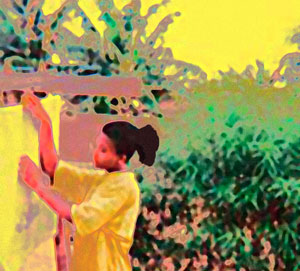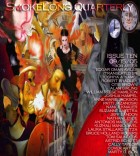Dirty laundry should be washed at home.
–Mexican proverb
The rusty white thermometer reads 40 degrees, but I can’t remember how hot that is in my native Fahrenheit. I only know that it’s hot, a two-shower day already, and it’s almost dinner time.
The aqua tie-dyed bedspread is dripping behind me on the line, stretched between the guanabana and papaya trees. I wipe the sweat out of my eyes with my forearm, sunburned and pink. It takes a long time to wash the sheets, and I’ve been scrubbing them against the cement washboard since siesta time.
Women in Tulum do the laundry early, before the sun has a chance to sear through the morning. I hear my neighbor washing even before I slip out from under my lavender mosquitero, before I’ve peed, before I’ve broken a sweat. She takes in laundry so she can have a little money; her husband blows what little he earns, and sometimes I hear the muffled sounds of their angry arguments through the fog of my sleep.
A mockingbird squawks and I dip my hand into the plastic bag and pinch out more Axiom. I sprinkle the detergent over the wet sheet and think of my grandma flouring the butcher block after punching down the bread. Axiom is pale blue speckled with green flecks, and it looks like it might taste like peppermint, but it smells like chemicals, and always irritates the middle finger of my right hand. The guy at the farmacia said that the pink peely scales were hongos, mushrooms, and gave me a cream but it didn’t help. That’s why I started sending my laundry to my neighbor.
But this sheet—-this sheet I wash myself.
I scrub back and forth, first the center, then work my way to the edges, then back to the middle again. I grab the stiff blue brush and rub and rub, back and forth, shh shh shh shh. The sweat trickles down between my shoulder blades under my faded fuchsia tank top. I sniff and catch a salty drop from the tip of my long nose before it drips into the foamy bubbles.
After I wring out the white sheet, I bend down to rinse it in the tub, then twist again, first the center, then the edges, then back to the middle again. You have to be careful with laundry in the tropics; you can’t let the tiny rusty spring in the clothespin touch the fabric or your stuff’ll be stained forever. I pin the wet sheet to the line and stand back. Clean. It looks clean.
I hear the suck of the refrigerator door, the ping of Federico’s beer bottle when he sets it down on the tile in the kitchen, but I don’t turn toward the house. I stand in the shade of the tree, and look up.
He fucked her, I know it. I tasted her in his mustache, inhaled her musky smell in our sheets. I bet it was the red-haired one, with the green sandals and the sarong with the little beads shaped like conch shells. Yeah, I’m sure it was her.
This year the papaya’s loaded with long water balloon-shaped fruits, pumpkin colored and splotched with black. For a long time, it was just a plain leafy tree to me, until our neighbor Don Raul asked me where are the papayas? You have to mistreat it, he said, if you want fruit.
A few days later Don Raul came over and whacked the tree with his machete. Eight or nine times he slashed the tree, cutting deeply into the gray bark. The next season, the tree started bearing fruit. The papayas taste slick and skunky, like sex, and I only like it when it’s cut into chunks drenched with long squirts of lime and circles of not-quite-ripe bananas.
The washtub’s handle rusted off a long time ago, so I squat down and put both my arms around it. I sniff again, rub my nose against my shoulder. The galvanized metal is warm from the sun, the water gray, the soap bubbles long having died. I see a thunderhead reflected in the tub, and crane my neck around, squint up into a coming storm.
The dirty water sloshes through the patch of grass I planted last year, it trickles down into the roots of the guanabana tree. No fruit there, yet. Too bad, because I love the feel of the a guanabana on my tongue, the softsour click when my teeth break through the tough skin, the cottony white pulp surrounding the stone. The first time I tried one I laughed and told Federico it reminded me of a testicle.
I watch the dirty water soak into our land then I twist my hair back into a knot. Federico stands at an angle in the doorway, bisecting it from the lower left to the top right. He grins at me, you look hot, he says.
I’m drenched, my tank is dark red now. The clean wet laundry drips behind me, the edges of the sheets only an inch above the dirt; they’ll get muddy if it rains. Muddy, but that’s not the same as dirty.
The rusted machete leans against the side of the house, below the kitchen window. The worn wooden handle feels smooth in my palm. I want guanabanas next season, I tell Federico. A rumble of thunder vibrates through the jungle, the hiss of rain to the south. My arms ache from the scrubbing, the twisting, the hanging, but I lift the machete high.
The blade has dulled; all that time resting in the jungle’s humidity. But the force of my blow surprises me—smack of metal on meat. The bark splits so easily, a milky white gash oozes from the trunk. I wipe my forehead once again. Only one whack, this time. But I am sure it will be enough.


